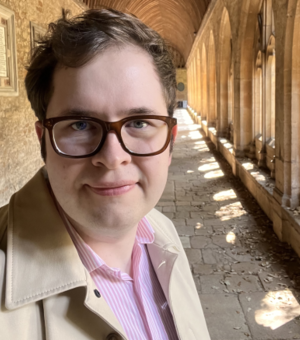Leif Hammer
Research Topic
Reconstructing eighteenth-century scholarly mentalities: a comparative study of the University of Oxford and the University of Copenhagen
Supervisors: Professor Avi Lifschitz & Professor Laurence Brockliss
About my work
My main research area is eighteenth-century university history. My interests range from the Enlightenment (in England, Scotland, and Denmark-Norway) to vagrancy and with trials in early modern Scandinavia.
My main research area is eighteenth-century university history, though my interests range from vagrancy in early modern Norway to witch trials and the Enlightenment.
My doctoral work (begun in 2021) is a cultural history of scholarly communities at the universities of Oxford and Copenhagen, c. 1714-1820. I seek to compare and discuss how the similar and different factors and contexts, internal and external, affected the scholarly communities' cultures and vice versa. By doing so, I explore how eighteenth-century scholarly identities were created and performed, constructed, and perceived, and how they tied in with global networks of learning, such as the republic of letters.
I am funded by the Aker Scholarship Foundation.
Activities
I have attended the History of Knowledge Doctoral Summer School at Lund University (worth 5 ECTS) in August 2024.
I am one of the co-founders and co-convenors of the Oxford Scandinavian Studies Network, an interdisciplinary forum open to anyone working on or interested in Scandinavia. Our goal is to strengthen interest in Scandinavia as a region and to promote exciting new scholarship.
Member of the Eighteenth-Century Research Forum (Copenhagen University).
Publications
Book Review of “ÖSTLING Kunskapens stora hus: Huvudlinjer i universitetets historia”, English Historical Review (2025)
“Knebukser, «Doctorhabit» og David Hume: en reise på 1700-tallet via København”, Historikeren 1 (2025), 6-10 [magazine article]
Conference & seminar papers
“The Body in the University: Scholars Suffering in Eighteenth-Century England and Denmark” (BSECS 54th Annual Conference, Oxford, January 2025)
"Academic Culture in a Town Square" (GRACEH 2024 – The 18th Annual Graduate Conference in European History, Florence, Italy, 15 April 2024)
"Fearful and Armed? Eighteenth-Century Student Culture in Denmark" (Magdalen College Convivium, Oxford, 2 February 2024)
"The King of Denmark-Norway at Oxford University: from Institutional Self-Fashioning to the Perceptions of Scholarly Outsiders" (BSECS 53rd Annual Conference, Oxford, 3-5 January 2024)
"'Terror' and 'Devotion': Emotional Experiences at the University of Copenhagen, 1770-1773" (History of Education Society, Annual Conference, Sheffield, 17-19 November 2023)
'"Decline" and the Cultural History of the Eighteenth-century University' (Graduate Seminar in History, 1680-1850, Lincoln College, Oxford, 24 January 2023)
Other research interests:
- Ludvig Holberg (1684-1754)
- early modern Scandinavia, esp. Denmark-Norway
- early modern British Isles, esp. England
- Enlightenment culture, networks, and literature
- early modern learned people and networks
- history of universities
- history of knowledge
- cultural history, esp. mentalités
- history of emotions
Previous degrees:
MLitt in Early Modern History (Distinction), University of St Andrews
BA in History, NTNU the Norwegian University of Science and Technology
Personal website




